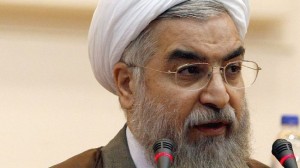 President-elect Hassan Rouhani used a Wednesday meeting with high-ranking clerics to declare the renewal of their role in the Islamic Republic: “The trust of the majority of the Iranian people in this seminary…is a source of pride and glory for me.”
President-elect Hassan Rouhani used a Wednesday meeting with high-ranking clerics to declare the renewal of their role in the Islamic Republic: “The trust of the majority of the Iranian people in this seminary…is a source of pride and glory for me.”
The declaration of Rouhani — the only cleric among the six candidates on last month’s ballot — had several objectives, as he prepares for his inauguration next month. The initial one was to establish his support for Ayatollah Khamenei, as he expressed gratitude for his “political success under the consideration of the Supreme Leader”.
At the same time, the President-elect’s statement was an implicit challenge to the repression of the regime, especially since the disputed 2009 election:
This destruction [of the clergy]…came from individuals who were sometimes two-faced and [boasted] of their relationship with religion….The fundamental group of clergy, the great clergymen and those who had a fundamental role in the revolution were unfortunately subjected to unfair and destructive attacks, but the people answered in these elections and wanted to say that ‘we view the clergy as the solution to political issues and view them as trustees of the prophet.
Ostensibly, Rouhani’s criticism could be portrayed as that of the outgoing Ahmadinejad Government, but his words can also be read as a riposte to the sustained attacks on clerics who questioned the crackdown on protests from 2009. Those clerics include Rouhani’s mentor, former President Hashemi Rafsanjani; Grand Ayatollah Yousuf Sane’i, whose house was attacked, and Ayatollah Dastgheib, whose offices in a Shiraz mosque were ransacked; and even the 2009 Presidential candidate Mehdi Karroubi, held under house arrest since February 2011.
Rouhani also linked his address to his theme of “moderation” and call for expanded social and media freedom:
We must remember that there may be various interpretations of Islamic law. We must not [impose] absolutism and call all leanings as takfir….In this regard, we must tolerate different leanings and correct their problems with admonition and good fighting, not confront them with accusations….
“Shi’a and Islamic thought are based on justice and moderation.
Journalist Given One-Year Sentence
Journalist Fatemeh Kheradmand, has been sentenced to one year in prison for “propaganda against the regime”.
Kheradmand, a member of Mir Hossein Mousavi’s campaign in the disputed 2009 Presidential election, was detained on 7 January after a raid on her home, spending 25 days in detention before release on $40,000 bail.
Kheradmand’s husband, journalist Masoud Lavasani, is under threat of a two-year prison sentence.
By Enduring America
The Iran Project is not responsible for the content of quoted articles.

 QR code
QR code